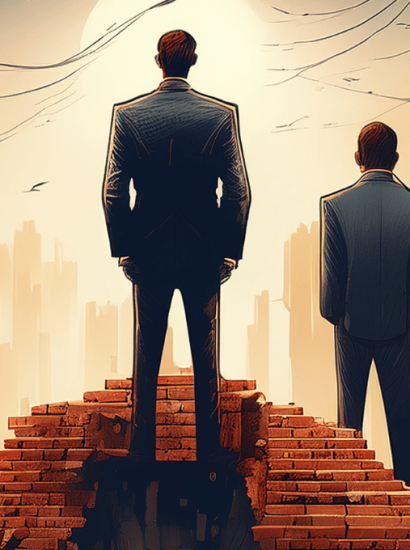This post is also available in: ΕΛΛΗΝΙΚΑ (GREEK) TÜRKÇE (TURKISH)
Almost 50 years after the invasion, the occupation is no longer a cause for a struggle for liberation or reunification through a compromise solution. Rather, it offers incentives to claim even more benefits
Last week, petrol station owners took to the streets with the oil companies behind them to demand a subsidy for the losses they suffered due to the invasion and occupation of our country by Turkey in 1974.
What did they tell us? That the residents of the cities and districts of Nicosia, Larnaca and the free Famagusta area, that is, almost half the population of Cyprus, are able to obtain cheaper fuel from the occupied areas through the checkpoints, resulting in losses in the order of 30-40%.
What are they after? They are claiming similar subsidies to those we gave the French company that built the airports in the free areas, on the grounds that it was losing profits from the illegal operation of Tymbou [Ercan] airport.
The precedent
The precedent being established in our country is dangerous. Anyone who comes to invest will legitimately be able to set an insurance clause stipulating that they must be compensated for loss of profits due to the occupation.
Understandably, after the invasion of 1974, thousands of refugees were accommodated in camps, and allowances and aid were given to companies and hoteliers to re-establish themselves in the free areas. It was all provided at the time on the basis of a temporary solution, since everyone believed that the problems would soon be over. Fifty years after the invasion, this allowance is still being granted to the few first-generation refugees who are still alive, and that is entirely appropriate. What we are not so sure about is that refugee allowances continue to be granted uncontrollably to many more. That is, to the children, grandchildren and great-grandchildren of refugees, whether by their father’s or mother’s side, regardless of whether they are married to a refugee or a non-refugee. In practice, a large part of the population of Cyprus is receiving benefits, be it indirectly or directly as refugees.
The occupation
Let’s look at another picture. Have we made ourselves comfortable? Everyone in this country refers to the invasion and occupation, but very few still call for a reversal of the faits accomplis. What seems to be the most definite sentiment is that almost 50 years after the invasion, the occupation is no longer a cause for a struggle for liberation or reunification through a compromise solution. Rather, it is an excuse to claim payment of some benefits. Several years after the invasion, when an editor of this newspaper wrote an article claiming that several dozen G/Cs who were listed as missing were in fact not missing, but victims of the coup who had been buried in certain cemeteries, some relatives threatened him because they felt there was a risk of their missing persons’ allowance being cut off.
After the ordinary refugees, the hotel owners and the refugee businessmen, Hermes and its airports joined the struggle for subsidies due to the invasion and occupation, as mentioned above. Now the oil companies and their workers want to join and there will be more to come. But why shouldn’t the Greek Cypriot supermarkets also climb on the bandwagon, since thousands of G/Cs go to T/C supermarkets for their daily shopping to buy the same or similar products at much cheaper prices? Why shouldn’t G/C hoteliers also start asking for benefits as well since there is a huge flow of tourists to hotels built in the occupied areas? Should the Casino Resort in Fasouri also apply for an allowance because it is competing with the casinos in the occupied areas? Why shouldn’t pharmaceutical importers also apply for compensation? Why not the confectioners too, citing, shall we say, the uncontrolled influx of ekmek kadayifi into the free areas? Fruit shops could easily enter the fray, regardless of whether the tomatoes and cherries that several of them have been selling for years actually come from Turkey.
As horrible as it sounds, getting comfortable with the occupation also has its perks for some. The geographically advantaged poor buy cheaply from the occupied areas and shopkeepers in the free areas affected are compensated. Some professional patriotic parties like DIKO [Democratic Party], EDEK [Movement for Social Democracy] and ELAM [National Popular Front] will persist. Day in and day out, they are obliged to carry out anti-occupation struggles, but at night they cannot prevent their supporters from crossing into the occupied areas to fill up with fuel, buy detergents, find cheap sneakers and buy viagra and firecrackers to celebrate their birthday.
In short, as time goes by, we will probably see more and more demonstrations taking place outside the Ministry of Finance demanding a subsidy on losses due to the occupation, while some “counter-productive demonstrations” at the checkpoints against the occupation and in favour of a definitive solution to the problem will become fewer and fewer. At some point, drastic solutions, such as the permanent closure of the checkpoints, will be demanded by the new victims of the invasion. In a few years there will be no refugees, but the struggle must continue. This was hinted at by the petrol station owners the other day. The struggle is no longer about returning. We used to go to the closed checkpoints to shout that our borders are in Kyrenia. Today, our border goes as far as Ayios Dometios, because right after that is Kioneli [Gönyeli] with its nice petrol stations, with its large supermarkets and patisseries, which are responsible for unfair competition.
The data before us in this particular case is not deceptive. Whether for the right or the wrong reasons (it no longer matters), in 2004 and 2017 the majority of Greek Cypriots sent the message that a solution to the Cyprus problem is not a priority. It is not right to blame the citizens for this. The blame lies with the country’s political leaders over time who have not had the courage to commit to difficult decisions. Allowing Cypriot citizens to get lost in ridiculous contradictions. Creating new role models of resistance in the faces of the petrol station owners and new traitors in the faces of the large-tanked Greek Cypriots who transport quantities of fuel from the occupied areas.
Our struggle
The whole of Cyprus joined the EU. On the basis of the Green Line agreement and in order to keep the prospect of a solution alive, the movement of people and goods is allowed. The lack of a solution logically affects the economic interests of some professionals. In the past, our main slogan was ‘Struggle for Return’. Today we want neither a struggle nor a return. Half of the Cypriots today want allowances and compensation because of the effects of the occupation. Over the last 50 years, and because this is what some politicians have chosen, the occupation has turned out to be an endless source of subsidies, much more stable than those granted as a result of the damage caused by hail in the mountainous areas and the potato blight affecting our potato plantations in the Kokkinochoria [red-soiled villages in the Famagusta area].
Source: INVASION AND OCCUPATION ALLOWANCES






